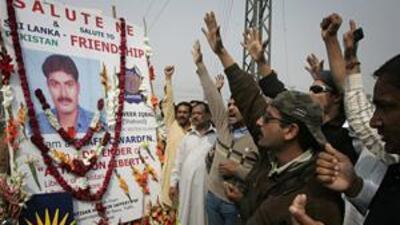LAHORE // By morning rush hour yesterday, the scene of Tuesday's commando-style attacks on the Sri Lankan national cricket team had been transformed into a mass shrine. Throughout the day, hundreds of people crowded around a massive poster dedicated to Tanveer Iqbal, a 26-year-old traffic warden who was among seven people killed in what Pakistani officials have described as an act of terrorism.
"Long live the traffic warden!" the crowd chanted between recited prayers, many laying flowers only a few metres from where he was fatally shot. The victims, identified by Pakistani authorities as elite force officers Tipu Sultan, Mudassar Kumboh, Faisal Butt, Sultan Farid and "Mahmoud", as well Iqbal and one of the team's drivers, Zafar Khan, were fatally shot when 12 heavily armed gunmen ambushed a convoy carrying Sri Lankan players and coaches to Lahore's Qadafi Stadium. None of the cricketers suffered serious injury.
In the aftermath of the bloodshed that tore through this relatively peaceful Pakistani city, the law enforcement officials who were killed in Tuesday's attack have been hailed as heroes and martyrs. Witnesses described them as human shields that served to protect the widely revered sportsmen. "The terrorists tried to kill the Sri Lankan players but the amazing traffic walas [wardens] saved them - they were so brave," said Ayub Shahid, an engineer who returned to the scene to pay his respects one day after witnessing the onslaught.
However, along with the tribute, there is also a belief circulating among Pakistanis, particularly within the country's law enforcement community, that the deaths could have been prevented had the officers been better equipped to confront such a sophisticated security threat. Traffic wardens said they were no match for the assailants, who were armed with AK-47 rifles, grenades and even rocket launchers.
"We are all empty-handed - this is the policy of the government," said Mohammed Faisal, a traffic warden in Lahore, standing alongside his shaken colleague Mr Shauwkat, who was just a few steps away from Iqbal when he was fatally shot. Pakistan's increasingly apparent security gaps have sparked international criticism about the country's ability to stifle its growing militant problem. Punjab's governor, Salmaan Taseer, said he would hold an inquiry into security lapses that might have paved the way for this broad daylight attack to occur at a major city junction. He denied allegations by the former chief minister Shehbaz Sharif that the security failure was the result of the recently heightened political wrangling in the province.
"We saved the Sri Lankan team," Mr Taseer said, suggesting that the tragedy could have been a lot worse had his government failed to provide the proper security precautions. Still, some law enforcement officers believe that much more could have been done to save their colleagues. "We could have done something about these attacks but none of us has a weapon and the police walas have only sticks. Who can fight the terrorists this way?" said another traffic warden who asked not to be identified for fear of repercussions.
Traffic police in Lahore earn an average of 20,000 Pakistani rupees (Dh920) a month. This low salary comes after a pay increase was approved by the former Punjab chief minister Chaudhry Pervaiz Elahi in 2006 in an effort to curb corruption among low-paid street officers. Traffic police also received new uniforms and greater job opportunities as part of the move by Punjabi officials. Still, they work long hours and receive nothing in the way of health care or social benefits.
Mr Faisal believes these conditions are unacceptable, particularly when faced with circumstances that put their lives at risk. "No weapons and no health care? It is so demoralising for us. How can we do our jobs properly?" he asked. "[Iqbal] is not a hero, he is a victim. It can happen to any of us." vsalama@thenational.ae

